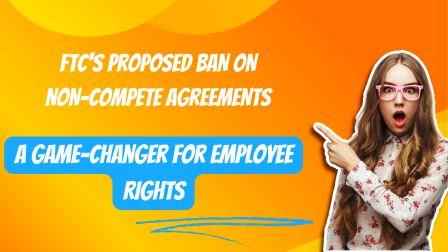The Federal Trade Commission (FTC) recently unveiled a groundbreaking regulatory rule that promises to reshape the landscape of non-compete agreements in the United States. This seismic shift has far-reaching implications for workers, businesses, and the economy. In this comprehensive blog, we delve into the details of the FTC’s final rule, explore its impact, and address frequently asked questions.
The FTC’s Final Rule: Banning Non-Competes Nationwide
On April 23, 2024, the FTC issued a final rule aimed at promoting competition, protecting worker rights, and fostering innovation. Here are the key provisions:
Scope of the Rule:
- For most workers, it is now considered an unfair method of competition to:
- Enter into or attempt to enter into a non-compete clause.
- Enforce or attempt to enforce an existing non-compete clause.
- Represent that the worker is subject to a non-compete clause.
- Senior executives (representing less than 0.75% of workers) have slightly different rules:
- Existing non-competes can remain in force.
- However, employers cannot enter into new non-competes with senior executives after the rule’s effective date.
Impact on Business and Workers:
- New Business Formation: The FTC estimates that the rule will lead to a 2.7% annual growth in new business formation, resulting in over 8,500 additional startups each year.
- Higher Earnings: The average worker’s earnings are expected to increase by an additional $524 per year.
- Health Care Cost Reduction: The rule could lower health care costs by up to $194 billion over the next decade.
- Innovation Boost: An estimated 17,000 to 29,000 more patents per year are anticipated under the new rule.
Background and Public Comment:
- President Biden’s directive in July 2021 prompted the FTC to explore limiting non-competes.
- The proposed rule, open for public comment until April 19, 2023, received over 26,000 comments.
- The final rule builds upon this groundwork to ban non-competes.
FAQs Regarding the FTC’s Final Non-Compete Rule
What prompted the FTC’s action?
- President Biden’s directive led the FTC to address the use of non-compete agreements, which were seen as exploitative and harmful to workers.
What does the final rule prohibit?
- For most workers, it bans entering into, enforcing, or representing non-compete clauses.
- Senior executives face similar restrictions but can maintain existing non-competes.
How will this impact workers and businesses?
- Workers gain freedom to pursue new jobs, start businesses, or bring ideas to market.
- Businesses face a paradigm shift, with non-competes becoming largely unenforceable.
What about existing non-competes?
- Existing non-competes for most workers become unenforceable.
- Employers must notify workers (except senior executives) of this change.
See Also- Understanding Foreclosure Defense Lawyer
Conclusion
The FTC’s bold move to ban non-competes reflects a commitment to worker rights, innovation, and economic dynamism. As the rule takes effect, the debate over employee rights and company practices will undoubtedly intensify. Brace yourselves—the employment landscape is about to transform! 🌟🔍
Disclaimer: This blog is for informational purposes only and does not constitute legal advice. Consult legal professionals for specific guidance on non-compete agreements.
